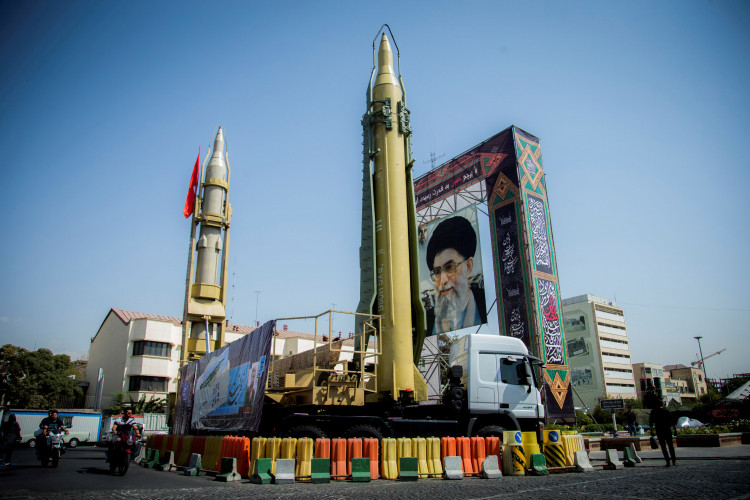Amid heightened tensions following the assassination of Hezbollah's leader Hassan Nasrallah in an Israeli airstrike, Iran's Supreme Leader Ayatollah Ali Khamenei has been relocated to a secure location, according to sources familiar with the situation. The move comes as Iran grapples with what is widely seen as a significant blow to its influence in the region. Nasrallah, a key figure in the Iran-backed militia and the linchpin of Tehran's regional alliances, was killed in a targeted strike on Friday, prompting fears of further escalation.
Reuters reported that Iranian officials, responding to the fallout from Nasrallah's death, have ramped up security protocols. This includes a directive from the Islamic Revolutionary Guard Corps (IRGC) for members to cease all use of communications devices, following Israel's recent sabotage of Hezbollah's communication infrastructure. The airstrike, which targeted Hezbollah's command headquarters in Beirut, also claimed the life of General Abbas Nilforoushan, deputy commander of Iran's IRGC, dealing yet another blow to Iran's regional military presence.
Khamenei's swift relocation reflects the Iranian regime's concerns about its internal security and the potential for Israeli infiltration into its ranks. Iranian authorities are now investigating possible breaches, with officials fearing that Israeli intelligence may have successfully infiltrated Hezbollah's top command. A security official from Iran indicated that a large-scale operation is underway to inspect communication devices for possible tampering, and a full investigation into personnel within the IRGC has begun.
Khamenei's public response has been defiant. "The blood of the martyr shall not go unavenged," he said in a statement on Saturday, vowing retaliation for the death of Nasrallah and calling for five days of national mourning. "The fate of this region will be determined by the forces of resistance, with Hezbollah at the forefront," he added, signaling Iran's continued support for the network of militias that make up its so-called Axis of Resistance, which includes Hezbollah, Hamas, and other proxy forces in Iraq, Yemen, and Syria.
Nasrallah's death represents a significant strategic setback for Iran, given Hezbollah's role as one of the most powerful militias in the region. Hezbollah, which has long served as Tehran's most effective ally in the Middle East, has played a central role in Iran's influence across Lebanon and its military engagements with Israel. Experts believe the elimination of Nasrallah could lead to a destabilization of Hezbollah's command structure, although his successor, Hashem Safieddine, is expected to take over the leadership mantle.
In the wake of Nasrallah's assassination, Iran's proxy forces have already begun responding. Houthi rebels in Yemen launched missiles at Israeli targets over the weekend, though the Israeli military successfully intercepted the projectiles. Other Iranian-backed militias in Iraq have claimed responsibility for drone attacks on Israel's northern borders, further fueling fears of a broader regional conflict.
Sanam Vakil, director of the Middle East program at Chatham House, commented on the potential for Iranian retaliation, suggesting that Tehran will look to save face and maintain its leadership within the Axis of Resistance. "This could result in a coordinated axis response, including actions from Iraq and the Houthis, or even a direct Iranian strike on Israel itself," Vakil explained. However, she warned that while Iran may seek revenge, it is mindful of the risks of further escalation that could provoke additional Israeli strikes.
Israel has been preparing for such responses. Since the strike on Nasrallah, Israel has bolstered its defense systems, anticipating missile strikes and potential retaliatory actions by Hezbollah's allies. Israeli Prime Minister Benjamin Netanyahu defended the strike, saying Nasrallah "had the blood of thousands on his hands" and was planning further imminent attacks on Israel.
This latest confrontation follows months of increasing tensions between Israel and Hezbollah, exacerbated by the Gaza war that erupted after Hamas fighters attacked Israeli civilians on October 7, 2023. Hezbollah has been heavily involved in cross-border skirmishes with Israel since the onset of the conflict, and Nasrallah's assassination is likely to harden Hezbollah's stance in the ongoing Gaza war.
For Iran, the stakes are high. The loss of Nasrallah complicates its strategy in the Middle East, where its network of militias has been instrumental in maintaining its influence. Additionally, Iranian President Masoud Pezeshkian accused the United States of complicity in the killing, further straining relations between Washington and Tehran. "The Americans cannot deny their complicity with the Zionists," Pezeshkian declared on state media, criticizing U.S. military support for Israel.
The U.S. State Department, meanwhile, has taken precautionary measures in response to the increasing volatility. On Saturday, it ordered the departure of non-essential personnel and the families of American diplomats from its embassy in Beirut, citing the unpredictable security situation following the airstrikes.




